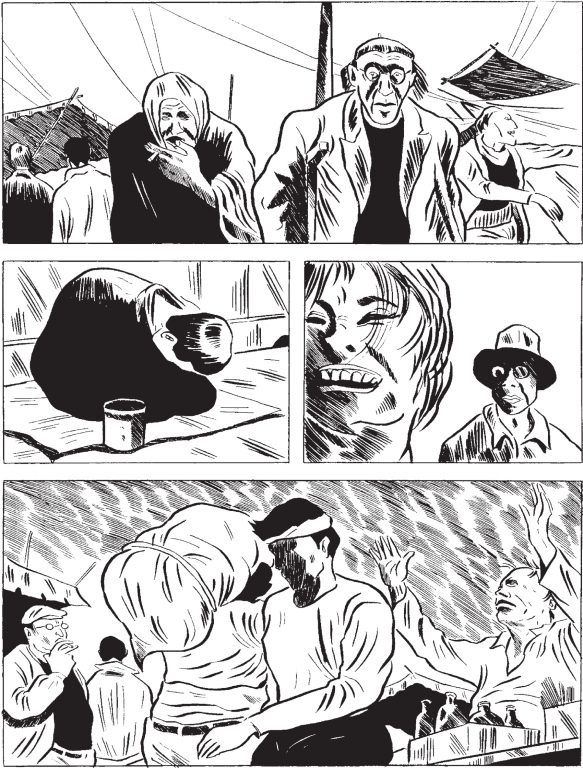Our weekly “column” Life Choices has been very useful way for me to keep track of some of my pop cultural consumption. It forces me as well to check out movies, shows, music, or other curious items to recommend to our readers weekly. The column has now migrated to Instagram as a social-first feature, which saves me the worry of finding more posts for our Instagram account (please follow @cnnphlife if you haven’t). Aggregating some of my recommendations here to double as a list of some of my recent favorites.

Video game: God of War (2018)
There’s a moment in God of War when you realize that this game is more than just a good ‘ol open world game. You play as Kratos, with his son Atreus, making your way to the highest peak in all the Norse realms to scatter the ashes of his [second] wife Faye, who is also Atreus’ mother. The main quest takes you to the elven realm of Alfheim, where you’ll find the Lake of Light, a glorious set piece that becomes accessible when you rearrange these towering structures that turn out to be runes. Behind them is a shaft of light, reaching up to the sky, bisecting the horizon. Instincts tell you that the light is a guide towards good, but the game hints that it may not be so. God of War lets you bathe in the bloody stories of Norse myths while central gods like Odin, Thor, and his sons are only spoken of initially, as if they’ve turned into tall tales in their own domain. There’s an undercurrent of melancholy and tragedy in the game and the [alleged] non-linear timeline of the game presents an emotionally devastating effect as well. I like the fact that there’s no legit “boss fight” in this game, you’re mostly going where the main story takes you. But the final battle in the game is probably one of the most heartbreaking things I’ve experienced in a video game.

Graphic novel: Slum Wolf by Tadao Tsuge (NYRB)
In Tadao Tsuge’s post-war Japan, the country feels like a wayward cloud. We make our way through red light districts, shanty towns, and gritty alleyways in the short stories collected in Slum Wolf. The stories (sample here) can feel a bit lumbering, like a vagabond wandering in the night, where going from one place to another is the surest way of surviving. Slum Wolf tells the tale of these ramblers, picking fights and bashing heads day-to-day. Tadao uses these characters, such as the brawler Sabu and the lonely office worker Aogishi, as studies of masculinity in Japan, which has been left in defeat after the war. “Without receiving a dose of pain once in a while, it was hard to remember the point of staying alive,” says one of the characters. Tadao’s detailed linework lets the shadows swallow his figures, who have seemed to have surrendered themselves into the ruins of their country.

TV Show: Ted Lasso (Apple TV+)
I’m not one for sports comedies but I started watching Ted Lasso to get the attention of my boyfriend, who is a Liverpool fan. Three episodes later, I was yelling at Apple TV+ for not dropping all the episodes in one go. People keep saying we all need a good laugh these days, and Ted Lasso (Jason Sudeikis, who is reprising the role which originated from a series of Premier League ads on NBC) is a ray of sunshine in these dark times. His unfailing optimism, even in the face of failure that he is set up for, is disarming. Basically, Lasso is sent to coach a football team in London only as a ploy for the team’s new owner, Rebecca Welton, to get back at her husband Rupert, a known womanizer who loves the team very much. “I want to torture Rupert. I want him to feel fucked in the ass with a splintered cricket bat, just over and over, in a constant loop, like a gif,” says Welton (the amazing Hannah Waddingham). The whiteness of Ted Lasso (complete with a Southern accent) feels a little puzzling, considering how many shows on T.V. aim to diversify the stories that we see now. But Lasso really is that guy that you’ll eventually love after the first few minutes of meeting him. He roots for the underdog, wants to put everyone in the team on equal footing — even the kit man, and even gives science fiction novels (A Wrinkle in Time, for example) to the boys to help them realize their potential.

Single: “Where the Sea Sleeps” by Day6 (Even of Day)
I don’t know if it’s the effect of the prolonged quarantine or just genuine appreciation to the song but “Where the Sea Sleeps” is one of those rare ballads this side of K-pop that sweeps you away and reduces you to tears. But “Where the Sea Sleeps” means more when you’re familiar with Day6’s backstory, and why this ballad matters so much to the band and the fandom —MyDay. As the band geared for another comeback earlier this year (the excellent The Book of Us: Demon), two of the band members, Jae and Sungjin, had to take a break because of mental health issues.
The Day6 maknae subunit Even of Day carries on the band’s journey, sans Jae and Sungjin’s guitars. They debuted with the “Where the Sea Sleeps,” which is obviously dedicated to the band's two absent members. The three members left, Young K, Wonpil, and Dowoon, are only working with bass, synths, and drums respectively. It yields an interesting product called The Book of Us: Gluon (which is a term for the binding force between subatomic particles). The album’s highlight is “Where the Sea Sleeps,” a stirring number that likens the end of a tumultuous journey to finding a place where storms and clouds gather still. It’s a nice piece to accompany the end of an odyssey full of darkness and anxiety.

